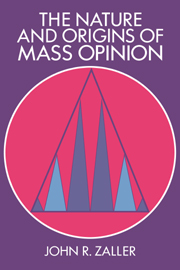Book contents
- Frontmatter
- Contents
- List of tables and figures
- Preface
- 1 Introduction: The fragmented state of opinion research
- 2 Information, predispositions, and opinion
- 3 How citizens acquire information and convert it into public opinion
- 4 Coming to terms with response instability
- 5 Making it up as you go along
- 6 The mainstream and polarization effects
- 7 Basic processes of “attitude change”
- 8 Tests of the one-message model
- 9 Two-sided information flows
- 10 Information flow and electoral choice
- 11 Evaluating the model and looking toward future research
- 12 Epilogue: The question of elite domination of public opinion
- Measures appendix
- References
- Index
6 - The mainstream and polarization effects
Published online by Cambridge University Press: 05 June 2012
- Frontmatter
- Contents
- List of tables and figures
- Preface
- 1 Introduction: The fragmented state of opinion research
- 2 Information, predispositions, and opinion
- 3 How citizens acquire information and convert it into public opinion
- 4 Coming to terms with response instability
- 5 Making it up as you go along
- 6 The mainstream and polarization effects
- 7 Basic processes of “attitude change”
- 8 Tests of the one-message model
- 9 Two-sided information flows
- 10 Information flow and electoral choice
- 11 Evaluating the model and looking toward future research
- 12 Epilogue: The question of elite domination of public opinion
- Measures appendix
- References
- Index
Summary
With the national inflation rate approaching the then-startling level of 7 percent, President Nixon went on television in late summer 1971 to announce a surprise decision to impose wage and price controls on the economy. Although such controls were a major departure from administration policy, the decision was immediately hailed by commentators across the political spectrum as a necessary step in the battle against inflation.
By good luck, there exist excellent data on the effect of Nixon's speech on public attitudes. A Columbia University survey of political activists happened to be in the field at the time of Nixon's announcement, and Gallup surveys on price controls bracketed the speech. The Columbia study found, first of all, that the speech had little effect on Democratic activists, who tended to favor wage and price controls even before Nixon spoke. But the effect of the speech on Republican activists was dramatic. Virtually overnight, support for controls among Republican activists shot up from 37 percent to 82 percent, a rise of some 45 percentage points (Barton, 1974–5). The Gallup surveys, meanwhile, showed that the public as a whole became about 10 percentage points more favorable toward price controls in the weeks following the Nixon speech.
This case suggests that a popular president backed by a unified Washington community can have a powerful effect on public opinion, especially that part of the public that is most attentive to politics.
- Type
- Chapter
- Information
- The Nature and Origins of Mass Opinion , pp. 97 - 117Publisher: Cambridge University PressPrint publication year: 1992



